
Rhostyllen
A history through pictures

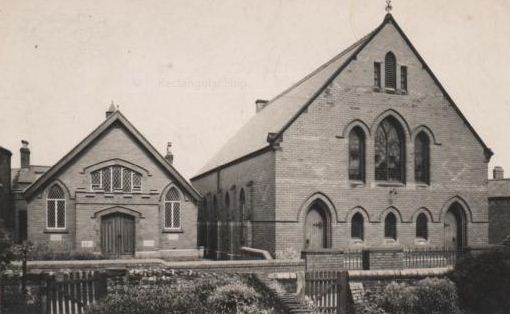
History of the Tabernacle Presbyterian Church
The 164th Anniversary of the Commencement of the Cause
The Cause appears to have started at Bersham in 1810, when a Sunday School was started there in a thatched cottage called ‘Ddol’. The owner was known as ‘Bodo Rolant o’r Ddol’. The blacksmith William Owen and John Roberts both of Wrexham combined with Edward and Richard Hughes from Adwy’r Clawdd. The scholars were taught in Welsh and one of the first pupils was the mother of Dr John Parry, Bala. In two years time the cottage was no longer large enough for the number of scholars, so the school moved to Edisbury where it remained for five years. This again became too small and another school was opened at Rhostyllen in the house of Jane Bailey. About this time John Elias, Thomas Charles and John Hughes used to come there to preach and on one occasion Thomas Charles led the children in the Catechism. It was not long before the number of pupils increased again and a disused iron foundry became vacant which had a large room measuring 880 square feet. This was taken over and meetings held for a further eleven years. Ultimately it became the Chapel vestry.
In the Faculty Book for the Diocese of St Asaph 1770 – 1828 there is an application by Richard Hughes (Papermaker) of Esclusham Below and Daniel Jones (Cheesemonger) of Wrexham for the registration of a “certain building situated at Bersham Iron Works……known as ‘Bridge House’…..to be used as a place of worship by an assembly or congregation of Protestants”. The date of the registration being 31st August 1818.
The first Tabernacle was built in 1828 by Mr Hughes, Adwy at a cost of £500. John Elias preached at the opening service in the morning in Welsh and Dr Steward of Liverpool preached in the evening in English. The Chapel accommodated 400. At this time the cause at Tabernacle was connected with the Welsh Church in Abbott Street, Wrexham, the morning service being held in Welsh and the evening in English. There was an English and Welsh Sunday School in the afternoon, the former being held in the Chapel and the latter in the vestry.
According to the St Asaph Faculty Book 1828 – 1890 the date of registration was 1836 when Richard Hughes again applied for the registration of “a Chapel and premises at Rhostyllen….. in the holding and occupation of the Welsh Calvinistic Methodist Society”, the date of registration being 8th August 1836.
There is a note in the Monthly Tidings for July 1818 to the effect that anniversary services were held at Tabernacle, Rhostyllen on June 8th.
In 1854 the Rev John Jones was appointed Home Missionary at the Tabernacle, which Ministry he held for ten years.
The Revival of 1859 did not pass by Rhostyllen and during this period many new members were added to the Church.
The Lancashire and Cheshire Presbytery met at Tabernacle in August 1868 in the presence of the Rev Thomas Charles Edwards MA (Bala), who was the Moderator when Mr John Daniels of Bersham was received as a Preacher within the bounds of the Presbytery. A satisfactory account was given of the state of the Cause at Tabernacle.
The well known Catechism ‘The Mother’s Gift’ was written and compiled by Dr John Parry, born in small cottage in Ddol, Bersham.
The Rev Joseph Jones ministered from 1855 – 1865 and in 1881 the settlement of Mr (later Rev) John Ernest Jones as Missionary at Rhostyllen and Glanyrafon was approved of by Presbytery held at Catherine Street, Liverpool on 26th January 1881. Mr Jones presented his paper of transfer from the Flintshire monthly meeting and was warmly welcomed as a Member of Presbytery where he remained for some years. In 1890 the Rev John Davies was called to Minister at Tabernacle and remained until 1892.
It was in the year 1892 that the Rev Thomas Jones of Bwlchyllan, Cardigan, later to become one of the outstanding preachers of the Connexion, was called to the Pastorate and became known throughout Wales as ‘Thomas Jones,Rhostyllen’. Under his Ministry and zeal for pastoral duty the Cause extended as the village grew in size when the Elders : Roberts, Daniels, F.T.F.Blew and Robert Powell along with their Minister applied to the Lancashire and Cheshire Presbytery held at Bangor Isycoed on the 2nd June 1896 and were granted permission to purchase land with cottages for £450 and proceeded to erect the new Tabernacle. It was announced at the Wrexham Presbytery on 6th April 1897 that the foundation stones of the new Chapel at Rhostyllen were to be laid on May 10th of that year and a hearty invitation was given to all to be present.
The only surviving members married by the Rev Thomas Jones and present at the laying of the foundation stones and the opening of the new Chapel are Mrs O.H.Roberts and Mrs F.J.Pritchard. This is the introduction to the address by the Rev Thomas Jones to Church Members in the Report of the Church in 1898 :
“ In reviewing the Report of our Church for the past year, we find that we have much cause to rejoice and to acknowledge the Lord with gratitude for His protection and guidance. It is impossible for a Church to stand still. It must either advance or lose ground and it is with pleasure we are able to state that we have gone forward and that our Church and congregation have increased during the year. ‘The Word of God has not returned unto Him void’ as some have been led to a knowledge of the truth. The influence of the Gospel has become deeper and wider in our place and it is our prayer that those whom we believe are halting between two opinions may be led very soon to a Christian decision.”
The Old Tabernacle by which it came to be known and later “The Assembly Rooms” continued to be used for Sunday School and social functions until it was sold in 1924.
The cost of construction of the new Tabernacle Church in 1897 was £2000 and it stands as a memorial of faith, courage and determination of the Minister and Elders of that time supported by a large band of enthusiastic young people. One source of revenue towards the Building Fund was the quarterly collection of pew rents by Mr W.H.Williams.
The Pastorate included Salem Chapel, Gyfelia and the Rev Thomas Jones was taken by horse and trap to his Sunday Services. Later he purchased a motor cycle and sidecar. From this time onwards the Church made progress and visitors often remarked about the Welsh spirit. The orchestra played for all Sunday services and the singing of both choir and congregation under the Precentorship of Mr Edward Jones and later Mr W.H.Williams (also the sick and poor visitor) was very commendable.
Mr H.W.Jones led the orchestra and assisted in the Psalmody Festival in 1909 at Victoria Hall, Brook Street, Wrexham. Mr Jones had scored in manuscript all the tunes sung in the services for all the instruments, 1st and 2nd violin, viola, cello, double bass, flute, clarinet and trombone.
On the 8th June 1898 Presbytery was held for the first time in the new Tabernacle under the Moderator Rev Owen Matthias of Coedpoeth.A full report on the state of the Cause at Rhostyllen was presented, which showed much faithfulness and good work in all directions. A most beautiful Chapel had been recently constructed and continued efforts were being made to liquidate the debt. The thanks of the Presbytery were expressed to the Rev W.Jones Ton for his valueable aid as Architect.
In 1899 at the Presbytery in Saughall, Chester Miss Laura Jane Daniel (first member to be married in Tabernacle) and Mr Fred Pritchard were awarded prizes in the under 21 division and Mr Llewelyn Jones of Sandycroft in the under 21 division.
The Revival of 1904 – 05 did not pass without several people joining the Church as a result of the wonderful meetings they enjoyed. World War One took it’s toll of a number of excellent young men of the Church and Sunday School. During the Ministry of the Rev Thomas Jones there were several meetings and associations attached to the Church, such as the Christian Endeavour Society, Bible Class and the Clothing Club. Each Sunday morning there was a Prayer Meeting at 10am for young men in the vestry. There was also a Drum and Fife Band which was the foundation of the orchestra.
The Pastorate of the Rev Thomas Jones came to a close after 30 years Ministry by his call in 1922 to Rake Lane, Wallasey, but the Rev W.J.Levi accepted our invitation to lead our congregation for more than nine years until he left for Tregynon at the end of 1931, having done much good work during his Ministry at Tabernacle. His widow Mrs G.Levi resides at Newtown. On the occasion of the departure of the Rev Thomas Jones and dedicated by his kind permission, Mr H.W.Jones composed the hymn tune ‘Rhostyllen’, which was sung to the words “I love to tell the story of unseen things above”, which appeared in the Festival Book for 1923.
The single Communion cup was replaced by sets of individual cups and trays, presented by the family of the late Mr Robert Daniel. In the days of the old Chapel services the Communion Set was kept at Ty Newydd by Mrs Edward Davies. She was a great help to the Sisters of the Church in supplying hot water, etc for functions and the vessels were easily handed over the wall into the old vestry.
In June 1923 the Church entertained the Association in the North when great spiritual meetings were held throughout the week and the Word was proclaimed amongst others by the Rev J.Puleston Jones, Peter Hughes Griffiths, John Owen, (Morfa Nefyn) and E.O.Davies.
Throughout the years from 1897 to 1974 it is abundantly clear from the Church Reports that the Sisters of the Church have contributed handsomely to the service of the Church by their efforts in Garden Parties, Christmas Fairs, etc. In 1903 the proceeds of the Bazaar were £175.
For two years the Pastorate was vacant and in 1934 the Rev R.R.Thomas accepted a call and during his Pastorate with a thriving Church and Sunday School, the new schoolroom was constructed adjoining the Chapel at a cost of £1100 and opened in 1936. His Ministry lamentably ended by his sudden demise. His widow Mrs E. Thomas and daughter Mrs J.Arnold Pritchard reside in Liverpool but are still members of Tabernacle.
The Rev Aeron Davies BA accepted a call to Tabernacle from the Welsh Calvinistic Methodist Church in Birkenhead and he remained Pastor until he received a call to the Churches at Montgomery and Berriew in 1959. The good wishes of the Church were expressed to Rev Aeron Davies, Mrs Davies, Gareth and Eluned at a farewell and presentation meeting held in the schoolroom prior to their departure. During Mr Davies’ Pastorate one feature of the efforts of the Church in October 1956 was the visit of the Association in the East. The Sisters of the Church entertained 150 delegates and others at the principal meals which were served hot, as much cooking and preparation being done in private houses. Prominent Ministers present included the Rev R.J.Rees Ma and the Rev Howell Williams, Cardiff. The Secretary of the Elders Meeting and Association Finance Committee was Mr J.W.Lloyd. Mr Robert Roberts acted as Secretary of the Arrangements Committee.
On the occasion of the 150th Anniversary, the Church under the interim Moderator the Rev H.Jones Griffiths, Minister of our sister Church at Hill Street, Rhos, an Active Pastoral Committee was formed to embrace the Pastorates of the Tabernacle Coedpoeth, Ruabon and Salem, Gyfelia.
The services on Sunday November 6th 1960 celebrating the 150th Anniversary of the Cause were conducted by the Rev David Williams BA, Port Talbot, past Moderator of the Association in the East. He referred to the founding of the Cause and the wonderful Ministry given to it by the Minister and Elders, whose names appear in this brochure and of the Elders appointed in later years whose names are also recorded.
May the Cause continue to prosper and may we continue to pray in all sincerity :
“God of our Fathers be the God of their succeeding race.”
Memories of Tabernacle Sunday School
I have been asked to write this narrative on behalf of the older members and past Sunday School scholars of Tabernacle Presbyterian Church and hope you will imagine that these are their memories. My early recollections are being taken to Sunday School by my parents, as they made sure my brothers and sisters attended Chapel from an early age.
The old building which had been the Chapel since 1828 was dear to all of us and when the new building was completed in 1897 the old fashioned high seats were removed as this formed a meeting place for the village named the Assembly Rooms be it political or otherwise.
From 1892 the resident Minister for the Chapel and the Sunday School was Rev. Thomas Jones ably assisted by his wife who involved herself in the village life. The Manse was also completed in 1897 and named ‘Springfield’.
Although the Sunday School was the predominant feature of my childhood we had concerts, entertainments and other meetings to supplement our religious education.
Needless to say being a little older than most of those children from Bersham the gap in years made little difference as living close to each other in Pentre, Bridge House and Ddol we found it desirable to walk with our families to the Sunday School in Rhostyllen. We walked up the hill and over the Pistyll using the wooden bridge erected over the Great Western Railway and from the Ddol via the ’46 steps’. After dark we needed a lamp to walk from Chapel home in case we fell down the bank towards the river.
My recollections of Sunday School were pleasant, as we read the Bible instead of using pencils and crayons as children do today. The only time we used pencils or pens was to write the answers to religious examinations.
Various young men went to war as soldiers from the village, as far back as the Boer War and the Boxer Rebellion in China and the village postman Jack Hanmer lost an arm. He was quite a lively character whilst attending the Sunday School.
The scholars increased in number mainly due to the perseverance of the Minister and the elder statesmen Robert Daniels, Edward Jones, Francis Blew, Richard Jeremy, W.H.Williams, H.W.Jones, Shem Price, J.R.Williams, Harry Jones and Mrs Bishop, Headmistress of the village school, who were all teachers in the Sunday School and officers of the Church. The secretaries were Mr Jos Williams, Mr Joseph Lloyd, Mr Harry Jones, Mr Pritchard, Mr Haydn Jones, Mr Harry Morgan and others.
There were a number of lady teachers whom I remember in the persons of Mrs Thomas Jones, Mrs Jeremy, Mrs Ivor Jones (an accomplished Church organist), Mrs Harding Jones and Mrs J.R.Williams.
During the years between 1906 and 1914 when the Great War broke out there were a few exciting outings and other events worthy of mention. I will leave these for someone younger than myself to narrate.
You may have heard that following the Methodist Revival of 1904 the congregations in the Churches and Sunday Schools increased in number and Temperance became a very important feature of membership of the Sunday School and Chapel.
By 1908 the question of the Licensing Law had been tabled in Parliament and the Officers and teachers met to consider what should be done to strongly oppose any laws which were likely to permit the opening of Public Houses on Sunday and also extending the opening times during the week.
It is on record that letters stressing the feeling of the Christian community of our Sunday School were sent to the Liberal Prime Minister Mr H.H.Asquith M.P., The Home Secretary, The Chancellor of the Exchequer, Mr David Lloyd George M.P., The Member for Flintshire Sir Herbert Lewis M.P. and Mr Herbert Roberts M.P., later Lord Clwyd.
Around the year 1910 after Mr Lloyd George had his National Insurance Bill passed through Parliament and old age pensioners over 70 years of age received 5/-
Between 1905 and 1914 some of our young members including Mr F.J.Pritchard and also Miss Pritchard and Miss Evelyn Jones and others had gained prizes and certificates in the Presbytery Scripture Examinations and these are recorded in the annual Chapel Report. Later on other candidates were successful namely : Mr J.Arnold Pritchard, Miss Gladys Edwards, Mr Donald Roberts, Mr Ernest Harding, Miss M.E. Harding Jones and Mr Trevor Jones.
Sir Herbert and Lady Lewis were the parents of the present Dr Mostyn Lewis of Gresford. It was Lady Lewis who founded the “Adelaide Lewis Trust” by the investment of money to produce the medals for the Presbytery Bible Class Examinations and this was administered by a representative of the Presbytery. The money is divided between Cheshire, Flint and Denbigh and the Lancashire and Cheshire Presbytery and Mr J.W. Lloyd has acted as Trustee and Treasurer of the fund for about 35 years at the time of writing.
It was always a feature of Sunday School life that an annual treat should be held. The usual places considered and voted upon were : -
Esclusham Hall Farm by train from Rhostyllen to Legacy
Eccleston Ferry near Farndon on the Dee by horse and brake. There is a letter in existence written by Mr Haydn Jones to the proprietor of the hotel asking prices for catering for the Sunday School.
Llangollen. On one occasion the Sunday School went by rail from Wrexham to Chirk. Then by canal boat from Chirk to Llangollen. Photographs were taken of the Sunday School scholars standing in the boat and some sitting in the bows and stern as there were quite a large number. Although the village was very small there were 180 scholars attending services. We returned from Llangollen by train to Wrexham and then by motor train to Rhostyllen. The Bible Class trip also visited Llangollen, Caergwrle and Parkgate as an annual treat for attending lectures and sitting the examinations.
The 1914-
It was a sad period between 1914 and 1918 and many of the ladies of the Sunday School and the Church used this time to knit garments, mittens and sew shirts for the armed forces. The orchestra was not a part of the Sunday School as such, although the instrumentalists were members of the Sunday School and Chapel, playing for all services and festivals.
During the war Mr C.J.Sheldon, Mr J.W.Lloyd, Mr Ernest Williams and Mr James Williams as young boys were able to keep the instrumental side alive by playing the organ. Mr Ernest Harding played the organ when on leave and Mr H. McBurnie Jones, Mr Haydn Jones, Mr Oswald Jones, Mr Wallace Jones and Mr Trevor Jones also brought their instruments when on leave. Other members returned in due course.
Prior to the first World War I remember that the men led by Mr F.J.Pritchard, Mr J.R.Williams, Mr Ben Squires and Mr James Squires performed Dickens’ plays ‘Marley’s Ghost’ and ‘Mr Pickwick’ in the Sunday School especially at New Year’s Eve coffee suppers. The orchestra providing incidental music.
The timber staging in the old Chapel (Assembly Rooms) was used for childrens’ concerts and Anniversary services, but on one occasion alittle boy in a velvet suit stood up to recite and when dismounting afterwards he caught his short trousers on a sharp nail and tore the material. He shall be nameless, but was helped down by Mr Daniel.
One concert which stands out was a children’s operetta entitled “ Mayday in Welladay”. This was directed by Mrs J.R.Williams and Mrs W.Herbert Jones ( late Mrs Wolfenden). The accompanist was Miss G.Jeremy at that time working in a Chemist’s shop in Chester and travelled by train and motor train to Rhostyllen in time for the weekly rehearsals at 7pm. There would be approximately 50 scholars in the operetta. This performance was during the first World War and we remember visiting the Croesnewydd Hospital to perform for the wounded soldiers.
Another operetta performed in the Sunday School was “The King of Sherwood Forest”. Minna Lloyd (Hodgkins) and Clifford Williams were principal players. Other concerts were arranged and the annual January concert saw most of the scholars participating.
At the end of the war and towards the 1920’s the Sunday School had grown with the return of the young men and the membership totalled 200 in 1922 when Mr J.W.Lloyd was the secretary. The Rev. Thomas Jones had moved to Wallasey and Rev. W.J.Levi had replaced him. It was inevitable that all the older statesmen would pass on and the Elders and senior scholars and teachers who were the juniors under Mr Blew and others had gained in experience.
Incidentally a number of young male scholars were members of the Billiard Club which met and played in the Assembly Rooms. A popular phase at that time was the wearing of bowler hats by the lads over eighteen. A few of these were in Mr W.Herbert Jones’ class, which filled the old chapel vestry where Mr Bert Williams, Mr Ivor Williams, Mr Dow Williams, Mr Stanley and Medwyn Williams, Haydn Jones, Seth Williams and many others.
Unfortunately the old building had to be sold in 1924 to defray certain debts on the new Chapel and this was a serious loss of accommodation. Among the annual appointments for that year was the position of Treasurer taken by Mr O.H.Roberts, which he held for three decades.
The Sunday School was now so large that senior classes and the junior school were housed in the new Chapel. Mr Harry Morgan was the Caretaker and later Sunday School Superintendent. Mr and Mrs Walter Ellis then took over followed by Mr and Mrs William Goodwin. Their son and daughter-
There is a long history to the present Chapel vestry as Mrs Harriet Edwards, widow of the late Mr Jack Edwards, ‘Bridge House’ had taught the following pupils : Howell Williams, Walter Williams, Eric Williams, C.J.Sheldon, J.W.Lloyd, James Williams, Ernest Williams, Norman Williams, Tom Cave, Elford Donald Jones, Lilian Edwards, Olwen Roberts, Edith Lloyd, Mary Harding Jones, Harry Roberts, Megan Roberts, Grace Herbert Jones, Winnie Cave, Eunice Cave and others in the Catechism and preparation for the primary Sunday School examinations. They also attended 6pm Bible Class on Tuesdays and the Band of Hope.
The Sunday School progressed and celebrated it’s Anniversary up to 1924 with services taken by Mrs W.H.Jones and Mr Ernest Harding. Mr W.H.Williams took the adult choir after Mr W.H.Jones and in 1930 Mr J.W.Lloyd took over the afternoon service until 1974. He also conducted the adult choir after the death of Mr W.H.Williams until 1974 when it was not possible to assemble sufficient voices to sustain a Cantata.
Numerous pianists have accompanied the worship in the Sunday School since 1920 including Mrs W.T.Griffiths (Miss Edith Lloyd), Mr Ernest Harding, Miss Florrie Jones, Miss Eileen Price (Mrs Whomsley), Miss Megan Roberts (Mrs Rogers), Miss Eleanor Rogers, Miss Elin Thomas, Miss Heulwen Lloyd, Mr David Griffiths, Mr Barry Humphreys and in later years Miss Judith Parry, Mrs Edward Jones and Miss Christine Roberts.
Other members coming of age and experience had taken on the mantle of Superintendent such as Mr Shem Price, Mr F.J.Pritchard and Mr Robert Roberts, who was first a Superintendent in the 1920’s and later Mrs R.R.Thomas, Mr Walter Charles Williams, Mr J.W.Lloyd, Mrs J.W.Lloyd, Mr Donald Roberts, Mrs George Parry, Mr Mervyn Roberts, Mrs J.R.Williams, Miss Jean Squire, Miss Ceinwen Williams, Miss Gaynor Williams, Mrs Mervyn Roberts and Mrs F.R.Smith.
Of former Sunday School scholars it would be proper to mention the names of Llewelyn Jones MA, B.Lit a member from 1890 to 1910 when the family left the village and Rev W.Harding Jones now retired from his Pastorate in West Ham. Another gentleman and former Sunday School scholar, the son of the late W.H.Jones and Mrs Jones (late Mrs Wolfenden), is Sir William Ewart Ray Herbert Jones FRS.
We record that amongst other Treasurers of the Sunday School was Mr Joseph Owen Roberts of the Old Post Office, the family that preceded Mr Owen H. Roberts. Two years after Rev W.J.Levi began his Ministry Mr J.W.Lloyd commenced the collection of Foreign Mission donations in boxes and later with cards which he continued to do up until the 1970’s.
After the Rev W.J.Levi had concluded his Ministry the Rev R.R.Thomas came to us in October 1933 and seeing the urgency of the growth of the Sunday School and to avoid further damage to the seats and furniture of the Chapel caused by the continual wear of it, he was successful in setting up a Building Committee of Church Officers and co-
The new Sunday School was consecrated in 1936 on opening and with the ante-
We have happy recollections of Iorwerth Jones, Elwyn Roberts, Kenneth Lloyd Williams and H.Goodwin, members of the Sunday School who made the supreme sacrifice. Other members were sent to essential work and Eric Davies and George Davies returned at the end of the war. The School continued its good work in the village and has always been an influence for good through its connections with other associations in the village. During this period Mr Eric Williams served as Treasurer.
The Rev R.R.Thomas died in 1955 and later the Rev Aeron Davies BA came from Birkenhead. He was a keen Minister with the children and Sunday School generally, often arranging for their appearance in Sunday morning services. During this period of Rev Aeron Davies’ Ministry the School maintained its standing in the village and some interest was taken in Presbytery examinations. He instituted the idea that each scholar who had a
Birthday should contribute a penny for each year of age to the Foreign Mission box.
During the many years of the existence of the school bronze and silver medals, in addition to prizes and certificates were awarded to scholars both senior and junior and this was maintained until about 1955 to 1960. When the Rev Aeron Davies left for the Pastorate of Montgomery and Guildsfield the Rev John Roberts took his place. Attendances were declining and Mr Robert Roberts did a noble job in keeping the Sunday School and Church together. This lapse in the pastorate from 1960-
From the construction of the Sunday School in 1936 until their respective demises as continuous teachers, the late Mr F.J.Pritchard and Mr Robert Roberts were the back bone of the Sunday School along with Mr J.W.Lloyd, who is still in office as Precentor. Not forgetting the senior ladies class which supports the Superintendent in all activities.
We appreciate the efforts of the Rev F.S.Smith in connection with visual aids to educate the very young scholars with pictures as they imagine the moral of every story he tells them.
Mission is an important part of the work as you will realise from the foregoing and the children still operate their annual collection by way of cards. The amount collected is generally about £20 per year.
J.W.Lloyd 1974
Various photographs relating to the articles above can be found under “Buildings and Street Scenes”, “Historic Buildings” and the “People and Events” sections of this website.

1833 -
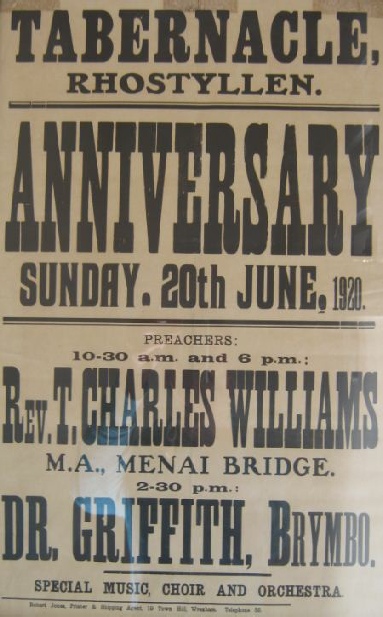
1920 -
1930’s Sunday School Outing to Esless Hall
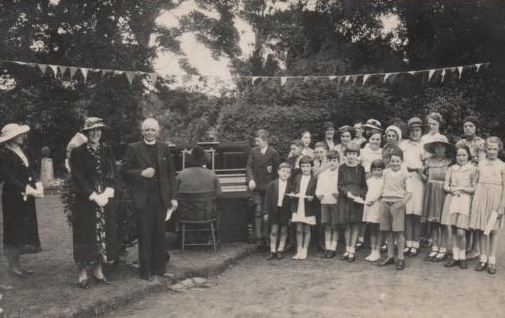
1930’s Tabernacle Chapel Christmas Play at the Parish Hall
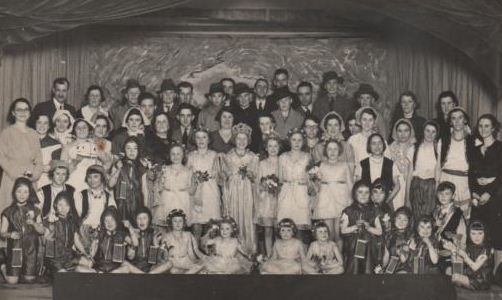
Tabernacle Sunday School Party
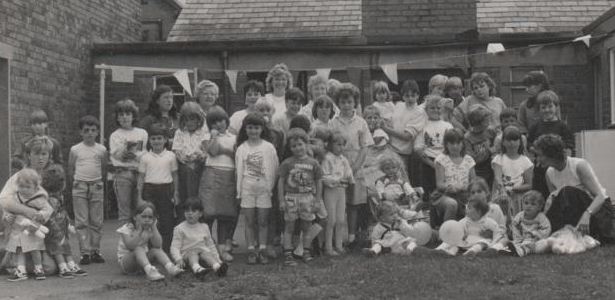
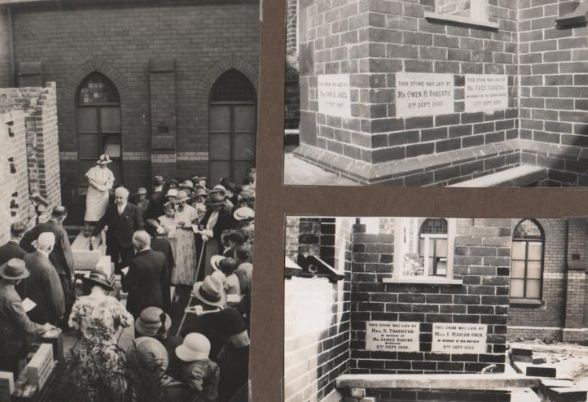
1935 -
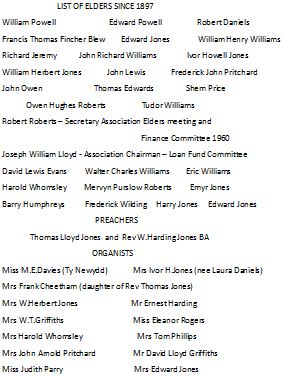
1956 -
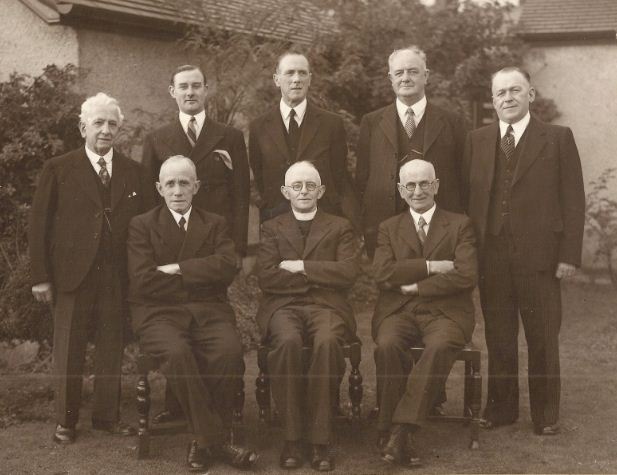
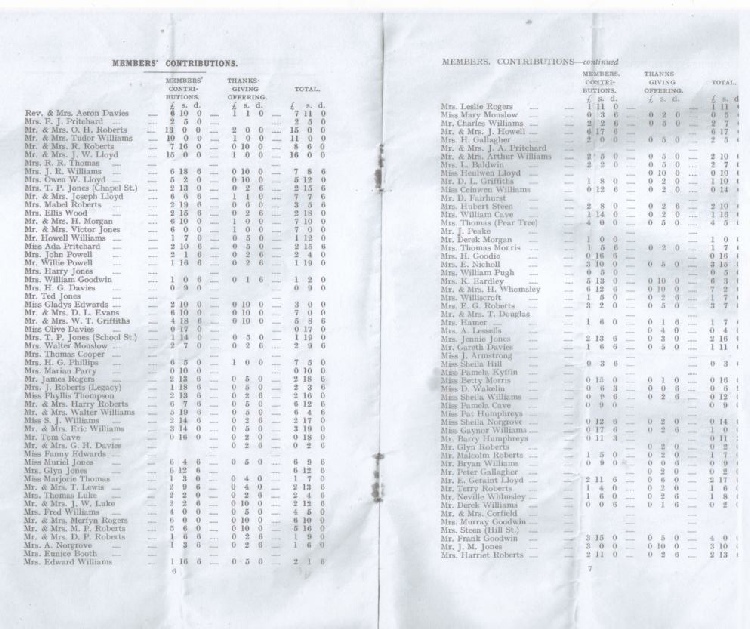
1956 -
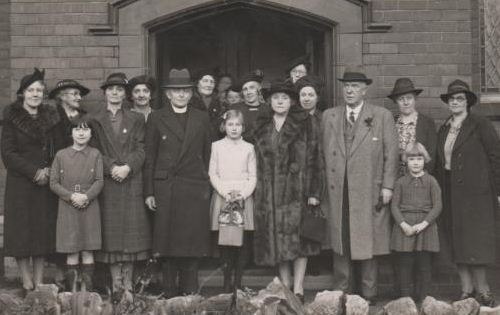
1936 -
Holy Trinity Church
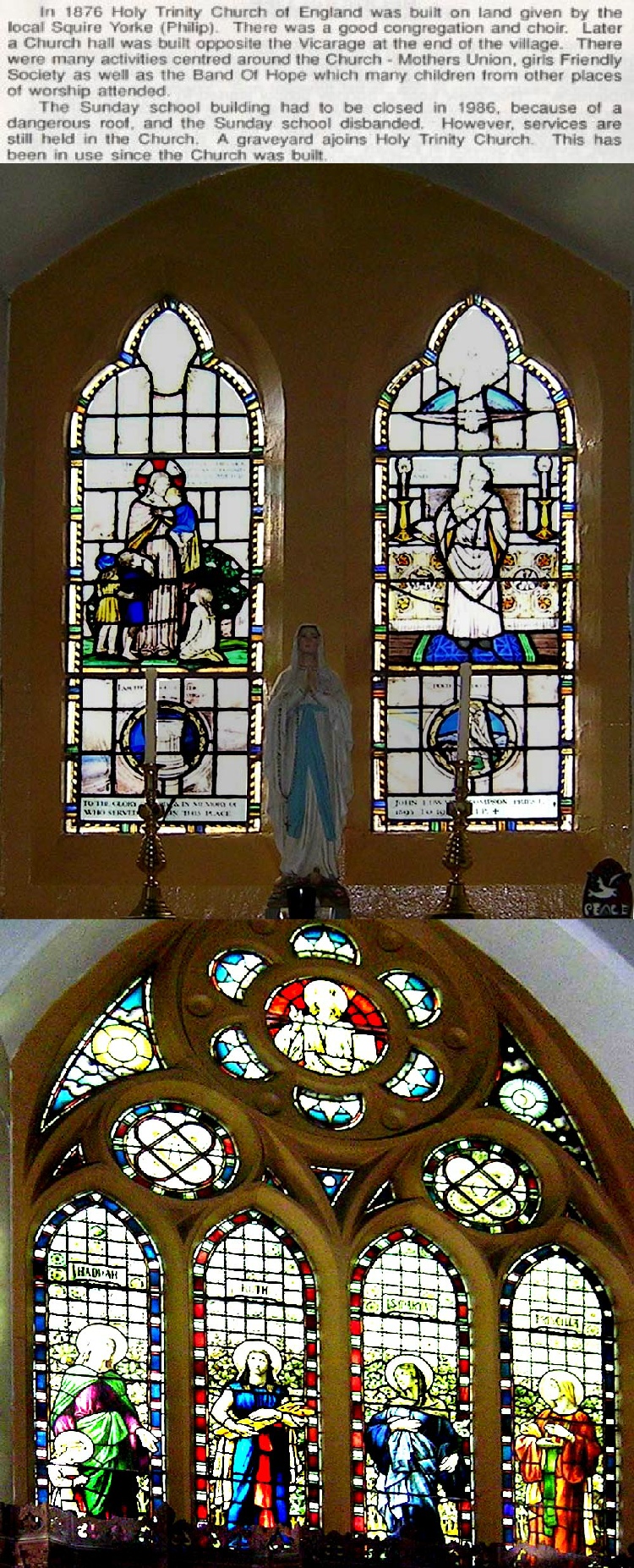
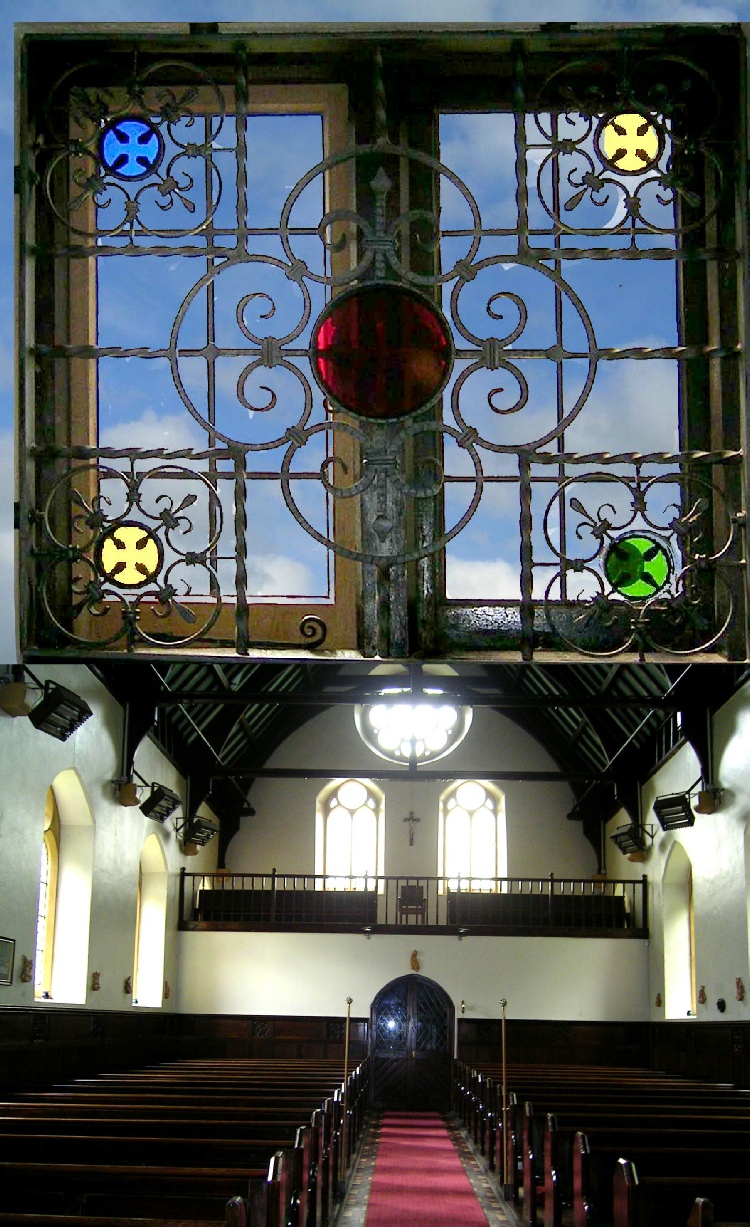
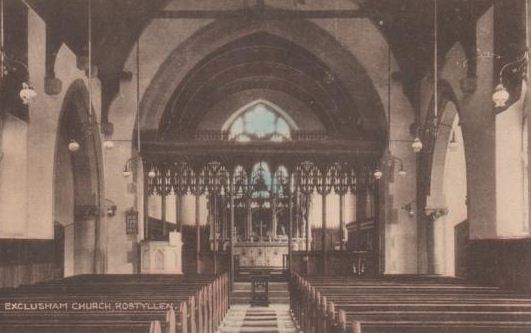
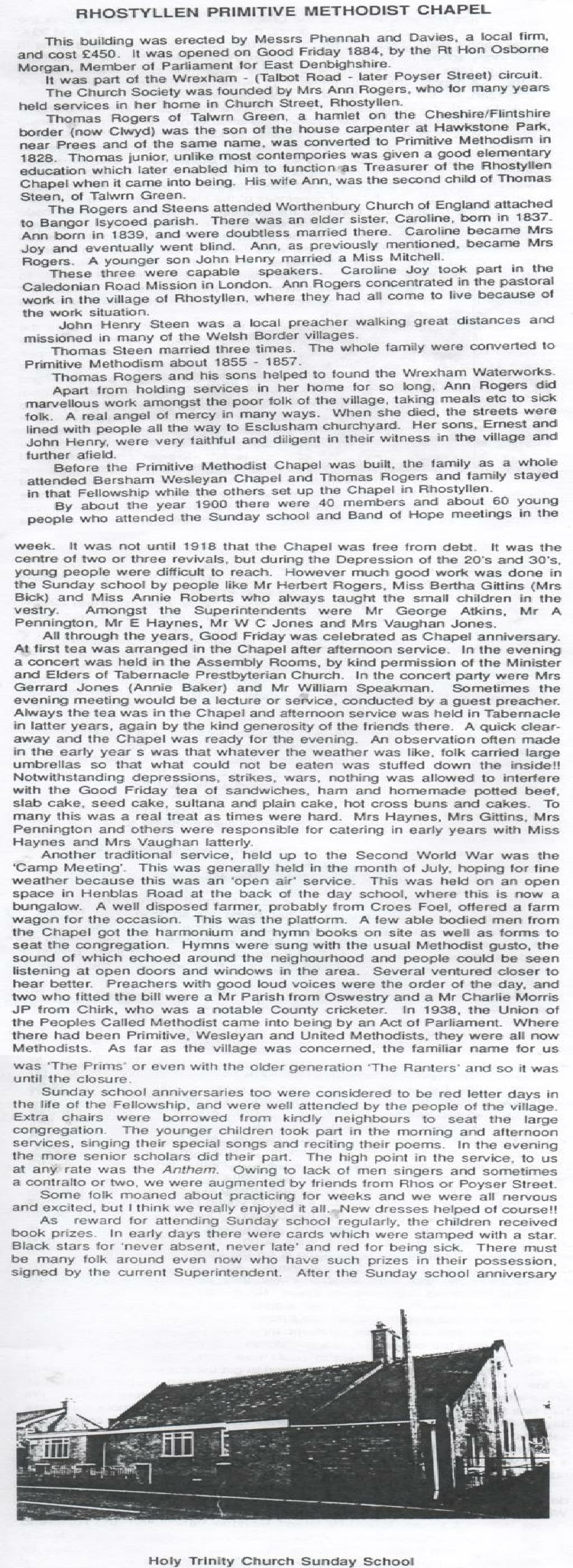
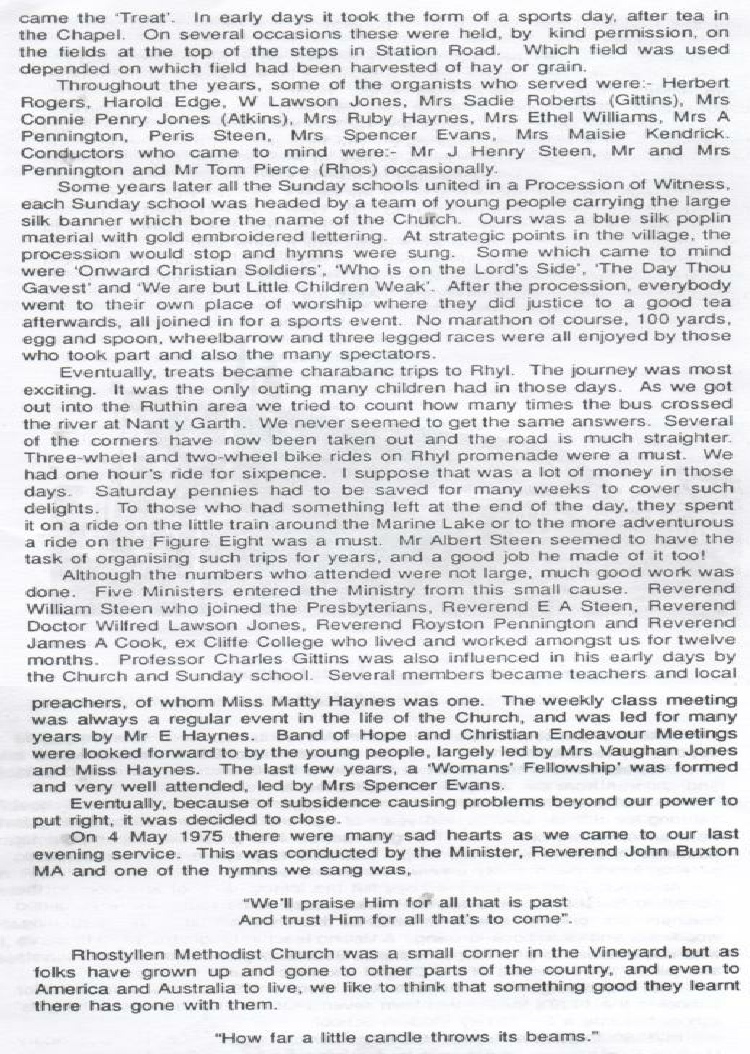
1922

1960 -
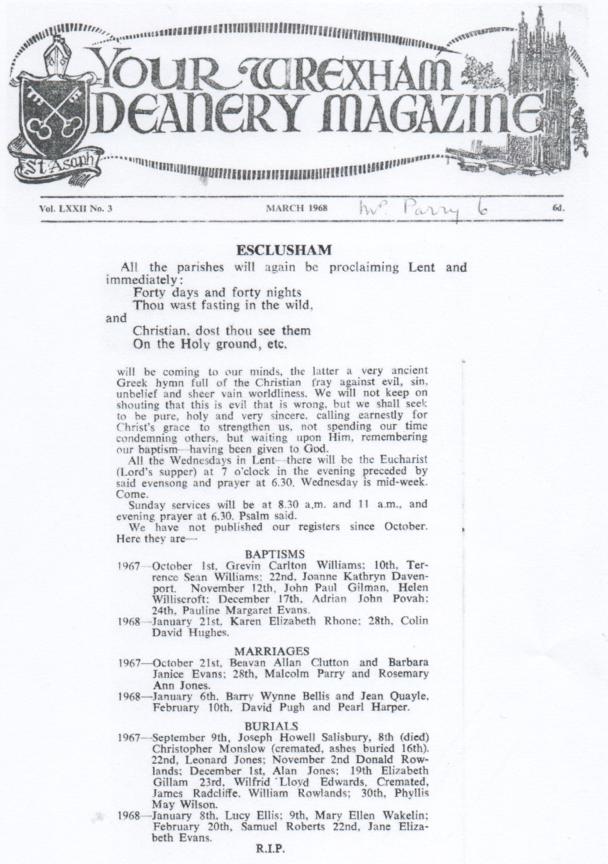
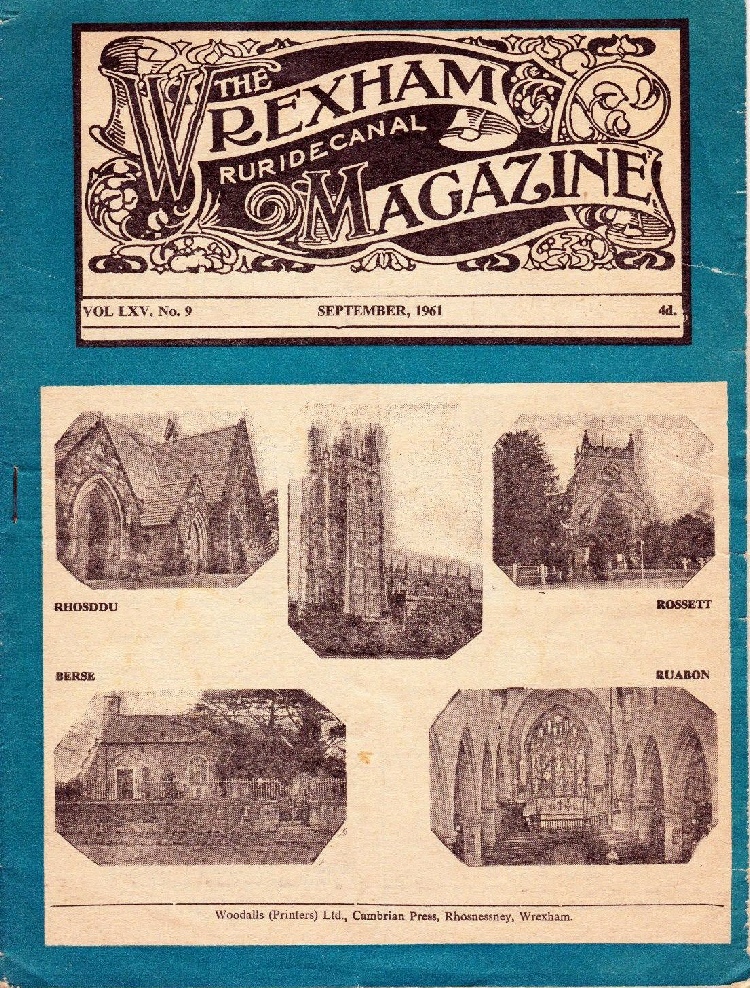
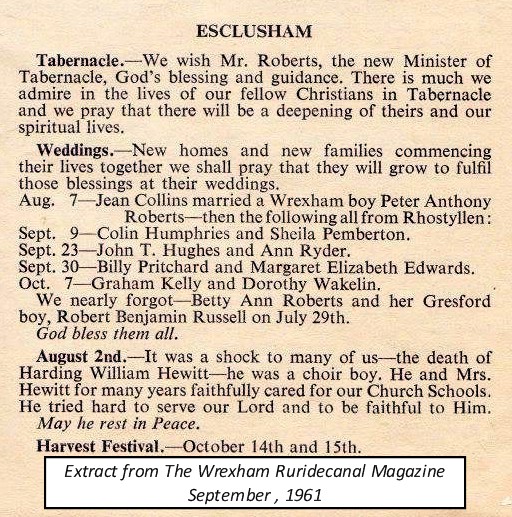
1961 -
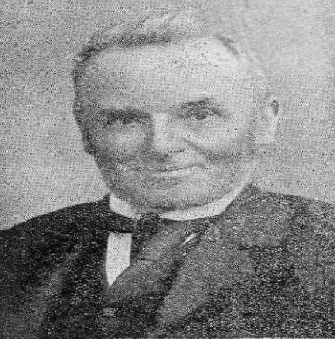
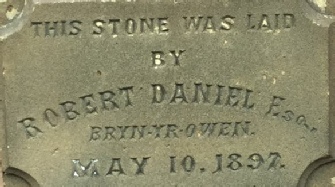
Robert Daniel (1843 -
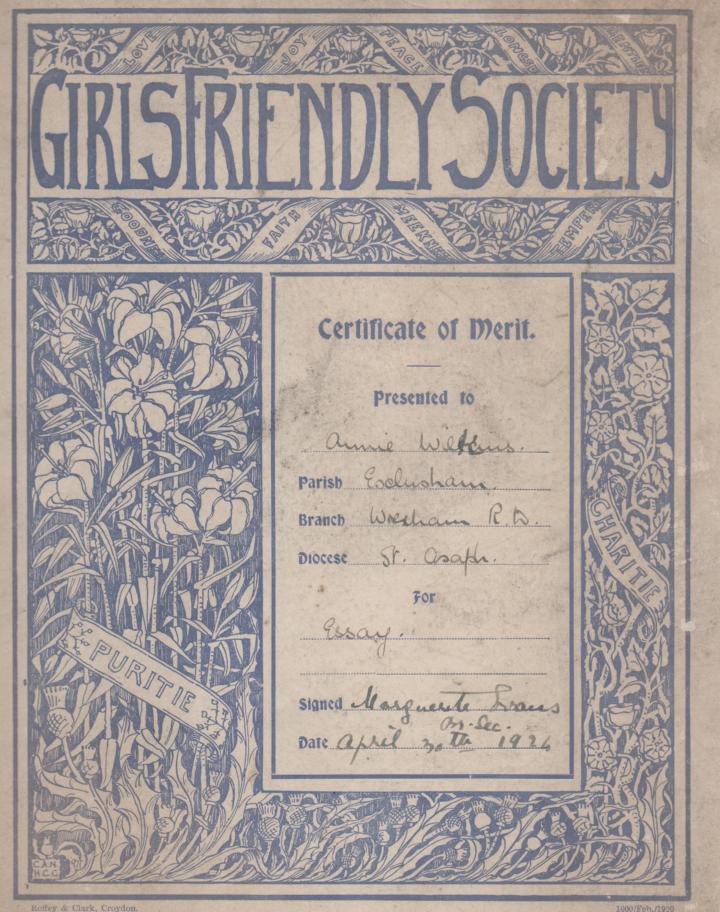
1924 -
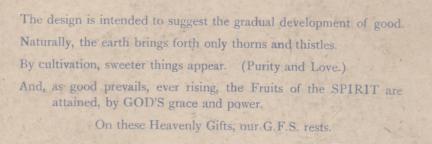
Girls Friendly Society Motto
Girls' Friendly Society was a pioneer youth organisation, founded in England in 1875 and run by women, which still operates in 23 countries. Originally established to protect young working girls, the Society continues to support girls and young women, adapting to the new challenges presented by a changing world.
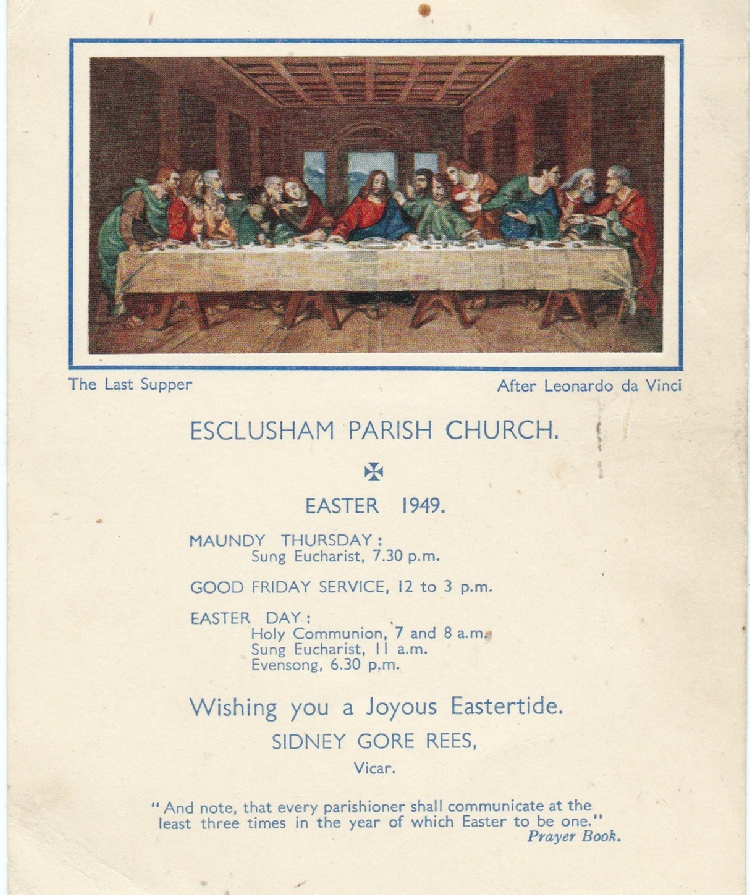
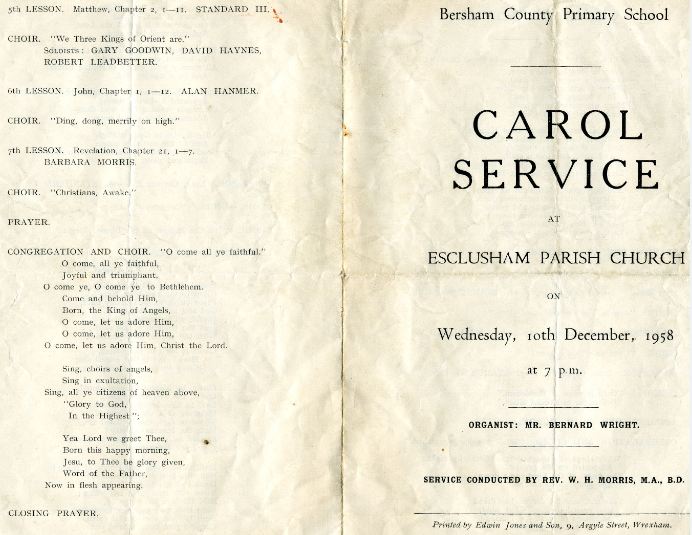
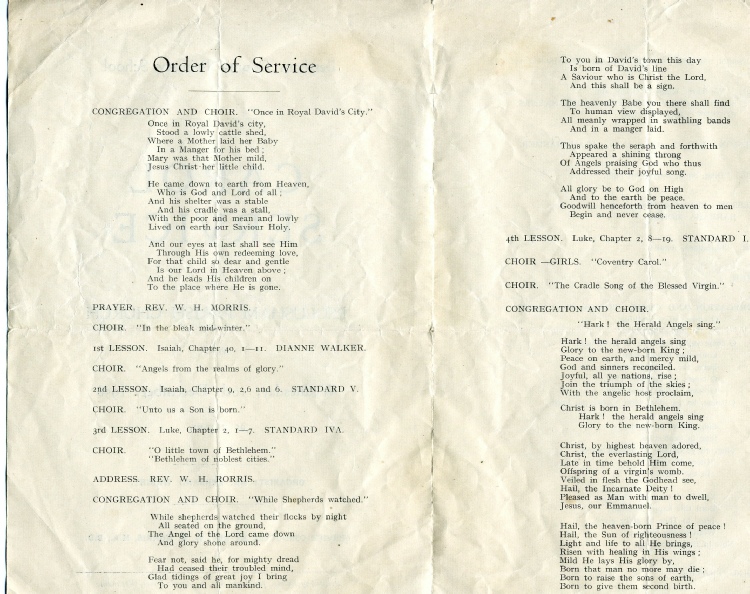
1958 Carol Service
Many thanks go to Bob Leadbetter for supplying this interesting document.
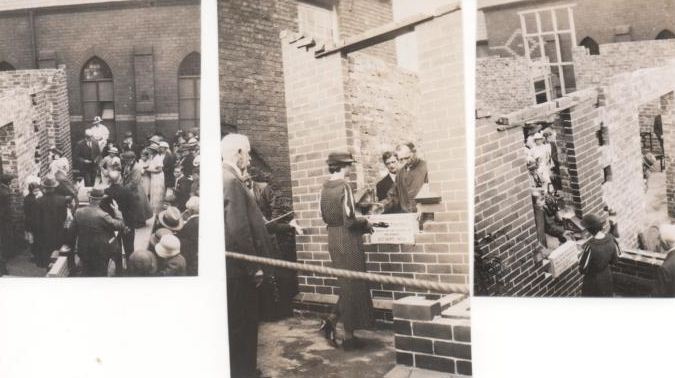
1935 Tabernacle Sunday School building